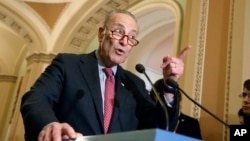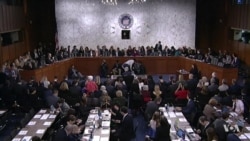Top Senate Democrat Chuck Schumer said Thursday he will oppose the confirmation of President Donald Trump's Supreme Court pick.
Schumer, during a speech from the Senate floor on the final day of hearings for nominee Neil Gorsuch, said he "was unable to sufficiently convince me he'd be an independent check" on Trump. The senator accused Gorsuch of having a "deep-seated conservative ideology."
Partisan Divide on Gorsuch Deepens After Confirmation Hearing
Republicans "will have to earn 60 votes for the confirmation," otherwise, Schumer said, they will need to "change the nominee."
Democratic Senator Bob Casey of Pennsylvania joined Schumer in announcing his opposition to the Gorsuch nomination, citing "serious concerns about Judge Gorsuch's rigid and restrictive judicial philosophy."
Republican leaders need to secure at least eight Democratic votes to pass the Gorsuch nomination, or they will need to trigger the so-called "nuclear option" to change the rules and allow the vote to pass with just a simple majority.
In 2013, Democrats invoked the nuclear option to require a simple majority on most presidential nominees, but excluded Supreme Court nominees.
A U.S. Senate panel considering the nomination heard testimony Thursday from lawyers, advocacy groups and other federal judges in the final stage of his confirmation hearing.
After Thursday, it will be up to the Senate Judiciary Committee to vote on whether to send the nomination to the full Senate. The panel spent this week questioning Gorsuch.
A committee made up of members of America's top lawyers group gave Gorsuch a "well-qualified" rating after contacting nearly 5,000 people around the country with knowledge of his qualifications.
Nancy Scott Degan of the American Bar Association said during testimony Thursday that the rating is based on integrity, professional competence and temperament. She also noted that the high rating isn't given out frivolously.
"The scope of our investigation was deep and broad," Degan said. "We do not give the well-qualified rating lightly."
Gorsuch was tapped by Trump to fill the Supreme Court seat left vacant by the death of Justice Antonin Scalia more than a year ago. During last year's campaign, Trump promised to nominate jurists who are committed to overturning Roe v. Wade, the linchpin for one of the most ferociously contested social issues in America.
During Wednesday’s session, Gorsuch described a landmark 1973 pro-abortion rights decision as "the law of the land."
"The Supreme Court of the United States has held in Roe v. Wade that a fetus is not a person," Gorsuch told the Senate Judiciary Committee, explaining the ruling that legalized abortion. "That’s the law of the land. I accept the law of the land."
A day earlier, Gorsuch described Roe v. Wade as legal precedent, but added that precedents can be overturned.
Over two days of testimony, Democrats repeatedly pressed Gorsuch on what they see as his pro-corporate record as a federal appellate judge. Rhode Island Democratic Senator Sheldon Whitehouse argued that corporations wield too much power in Washington, given their unlimited ability to make financial contributions to political campaigns, thanks to a Supreme Court decision known as Citizens United.
Gorsuch responded that, rather than looking to the courts to rein in corporate influence, lawmakers could do the job themselves.
"There's room not just for litigation, Senator, but legislation [as well]," the nominee said.
Whitehouse replied that a Congress beholden to corporate interests will never do as Gorsuch suggests.
"Here's the problem. ... Once you let certain political interests achieve the kind of dominance that Citizens United has let them get, they can start to exert disproportionate control over Congress, and now Congress can't do that any longer because there is no longer a fair playing field," Whitehouse said.
Whatever objections Democrats may have, blocking Gorsuch from the high court will prove difficult. Republicans are in the majority and have the votes to approve him in committee and send his nomination to the full Senate. Once there, Republicans can change Senate rules to eliminate Democrats' ability to block a final vote through the filibuster.
VOA’s Joshua Fatzick contributed to this report.








